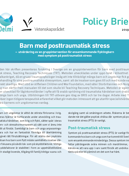This policy brief summarizes new research on suicidal behavior and care among refugees, other migrants and Swedish-born. It aims to discover pathways to suicidal behaviour (suicide attempt and suicide), patterns and determinants of health care before and after a suicide attempt and moreover determinants of a poor prognosis following a suicide attempt in immigrant subgroups compared to the native population.
Overall conclusions and recommendations:
- Compared with the Swedish-born population, refugees generally have a lower risk of suicide attempts and suicide. The risk of attempting suicide among refugees in general also seems to decrease somewhat over time, but more research is needed to find out what the underlying risk and preventive factors are.
- Refugees suffering from mental illness are less likely to be admitted to hospital for suicide attempts or to die by suicide compared to Swedish-born people. However, more knowledge is needed, above all about preventive factors for suicide attempts and suicide among refugees with mental illness.
- Both before and after a suicide attempt, refugees generally use specialized care to a lesser extent than Swedish-born people who have been cared for after a suicide attempt. Follow-up care for refugees who have been cared for in relation to a suicide attempt should therefore improve accessibility and in other ways work for a better reception.
About the author
Ellenor Mittendorfer-Rutz is professor at the Department for Clinical Neuroscience at the division of insurance medicine at KI. She leads research group that studies ethiology, treatment and prognosis of mental disorders and suicidal behaviour.
Picture by Snowscat from Unsplash.

